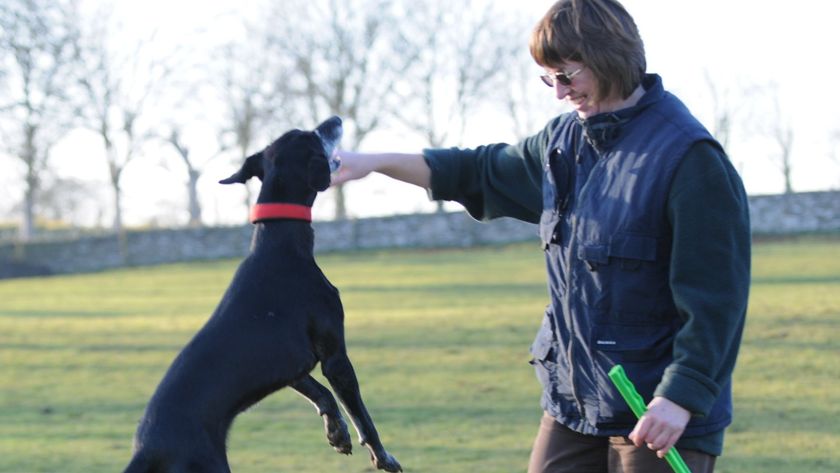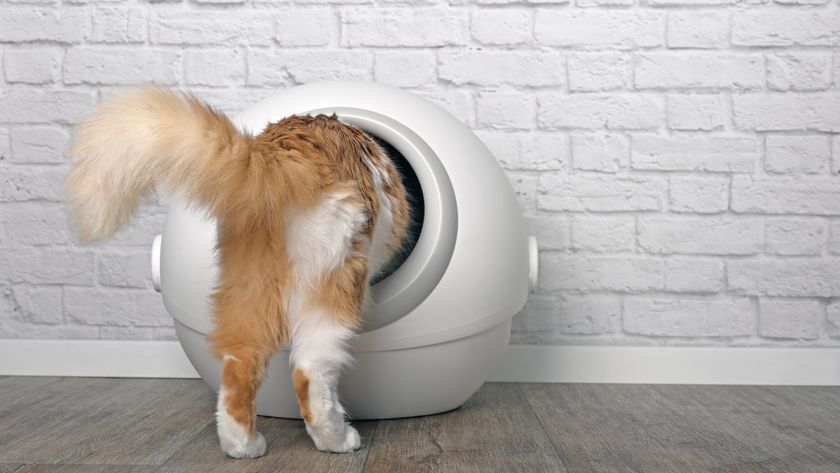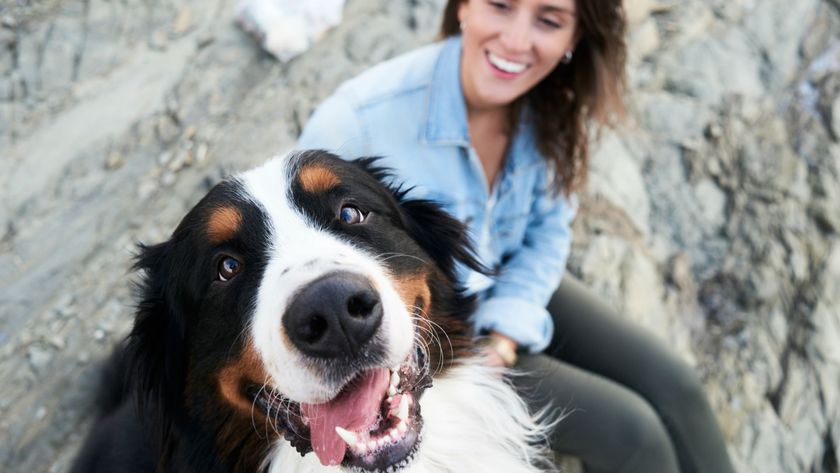Why do dogs yawn?
The answer to the question ‘why do dogs yawn?’ is a complex one. We breakdown the most common reasons and reveal when yawning is a cause for concern

Why do dogs yawn? It’s a question you may have found yourself asking as you watch your dog stretch or laze about at your feet. And while it may be tempting to put it down to tiredness, just like with us humans, the reasons why dogs yawn is not yet fully understood.
Yawning is a very normal behavior in dogs, but does it actually mean they’re tired? Or are they bored? Content? Stressed? Well, potentially, it could be any one of those things! There are a lot of different thoughts around the reasons a dog yawns and what function those yawns serve, but one thing almost everyone can agree on is that a yawn is a form of communication.
While you likely yawn for one of two reasons (boredom or tiredness), there are many more physiological and emotional reasons that may cause your canine companion to do the same. Not all dog yawns are created equal, so it’s important you have an understanding of what it is your pooch may be trying to tell you.
To help you figure out whether a yawn is just a yawn or whether there’s something more going on that you need to pay attention to, we’ve decoded some of the most common messages your dog’s yawn is trying to send you and let you know when your furkids frequent yawning may be a cause for concern.
- Why does my dog stare at me?
- Why do dogs sleep so much?
- Why do dogs chase their tails?
- Why do dogs get the zoomies?
Why do dogs yawn?
While tiredness and boredom are the two main reasons why we humans yawn, it’s a much more complicated picture where our canine companions are concerned. For them, yawning could serve any number of physiological or emotional functions, so let’s take a closer look at the most common of these.
Physiological reasons
Dr. Robert Provine, a neuroscientist and Professor of Psychology at the University of Maryland, has studied what he calls ‘yawn science’ in both humans and dogs since the 1980s. He believes that a yawn may signal a change of physiological state, for example, when a dog moves from sleep to wakefulness, wakefulness to sleep, anxiety to calm and boredom to alertness.
But that’s not the entire picture. A yawn may also be a physiological response to seeing someone else yawn. That’s right, contagious yawning affects dogs just as much as it affects humans. In fact, a 2008 study conducted at the University of London showed that out of the 29 dogs that took part in a contagious yawning experiment, 21 of them yawned when they saw a human yawn. Scientists believe that contagious yawning plays a role in social bonding and empathy amongst both humans and dogs.
Emotional reasons
As well as changes in physiological state and contagious yawning, there are also emotional reasons your dog may yawn, with stress being the most likely of the bunch.
Both Provine and Norwegian behaviorist Turid Rugaas, who wrote the book ‘On Talking Terms With Dogs: Calming Signals’, believe that yawning is one of several ways dogs will try to calm themselves down when they’re feeling stressed or uneasy.
If you’ve noticed that your canine companion yawns when they’re at the vet, around new people, or being told off, there’s a good chance that they’re using yawning as a way to soothe themselves.
Rugaas believes that yawning may also be a mechanism dogs employ when they’re trying to avoid conflict or diffuse a situation which makes them feel threatened. For example, your dog might yawn if they find themselves in an altercation with a bigger or more aggressive dog.
But, as with all doggy behavior and communication, it’s important to look at their whole body to get a sense of what they may be trying to tell you. Is their yawn accompanied by:
- Tucking their tail between their legs?
- Pinning their ears back?
- Keeping their gaze averted?
These are all classic signs that when paired with a yawn are good indicators your dog is finding something in their environment stressful.

When yawning is a cause for concern
It’s important to note that 99% of the time, your dog’s yawn won’t be any cause for concern. More often than not, they’re simply moving between one physiological state and the other or experiencing contagious yawning. But, if you do notice your dog yawning frequently or rapidly, that’s something you want to pay attention to.
When your dog starts stringing their yawns together, that’s a good indicator that there’s something about their current situation, whether it be their location or who’s around them, that’s causing them stress or anxiety. If you’re able to, remove them from that environment and see if the yawning stops.
For excessive yawning that continues even after you’ve made changes, it’s worth consulting your vet or an animal behaviorist. Separation anxiety in dogs is not uncommon and it’s another possible reason that could help explain frequent yawning. Partnering with a professional can be helpful in coming up with strategies to help your dog cope when they’re apart from those they love.
Is there anything I can do to help my dog stop yawning?
Well, as a matter of fact, yes there is! If stress is the reason behind your dog’s yawning, there’s a lot you can do to help them feel safe and secure.
- Create a calming space within your home that’s just for your dog. Furnish it with one of the best dog beds (a donut-style bed with high sides is a great choice) and pop in a nice blanket to help them feel cozy.
- Make sure that you have a good selection of the best dog toys on hand for your canine companion to play with. Soft and snuggly toys are particularly good for popping in their crate or bed at night or when you’re out of the house.
- Keep your forever friend inside during potentially stressful periods like the Fourth of July and New Years where fireworks are likely to be let off. You may like to invest in a device like the RelaxoPet Pro, that uses vibration technology to help calm anxious dogs and cats.
- Watch how your dog behaves in certain environments, situations and around other dogs and people. Learn their signs of stress and move them away from things that seem to regularly scare them.
It’s clear that yawning in dogs is a complex function that has several potential causes. While stress is indeed one to be on the lookout for, most of the time your dog’s yawns are completely harmless and most likely the result of a change in their physiological state or catching a case of the yawns from you!
PetsRadar Newsletter
Get the best advice, tips and top tech for your beloved Pets

Kathryn is a freelance writer who has been a member of the PetsRadar family since it launched in 2020. Highly experienced in her field, she's driven by a desire to provide pet parents with accurate, timely, and informative content that enables them to provide their fur friends with everything they need to thrive. Kathryn works closely with vets and trainers to ensure all articles offer the most up-to-date information across a range of pet-related fields, from insights into health and behavior issues to tips on products and training. When she’s not busy crafting the perfect sentence for her features, buying guides and news pieces, she can be found hanging out with her family (which includes one super sassy cat), drinking copious amounts of Jasmine tea and reading all the books.










